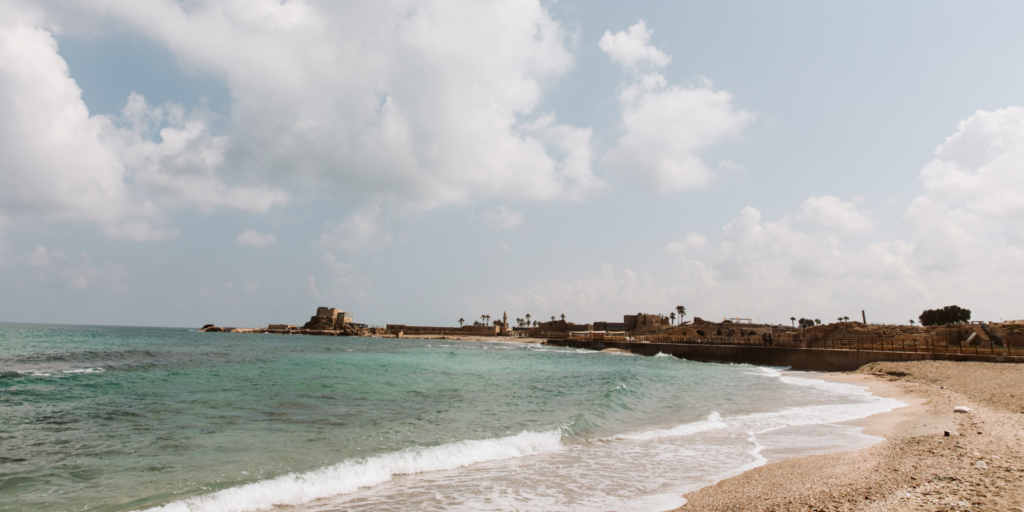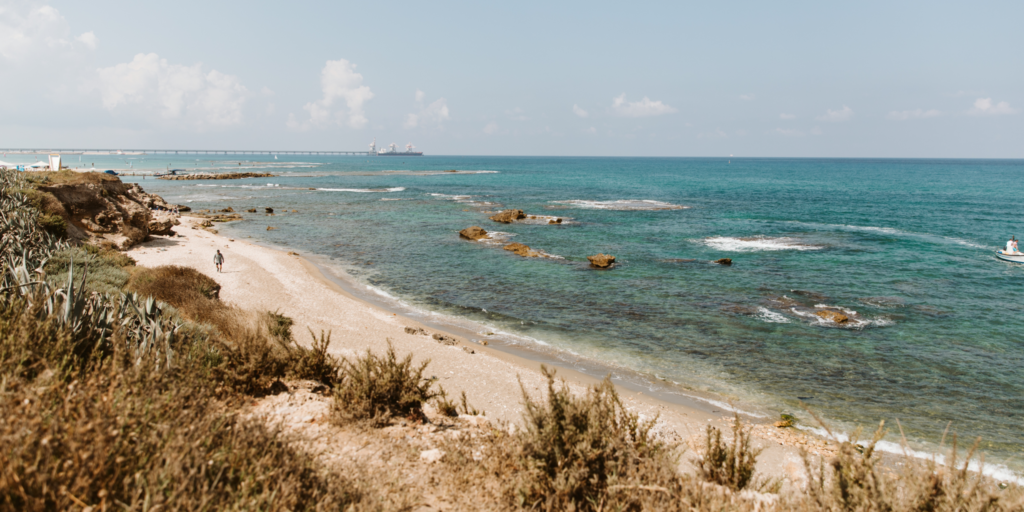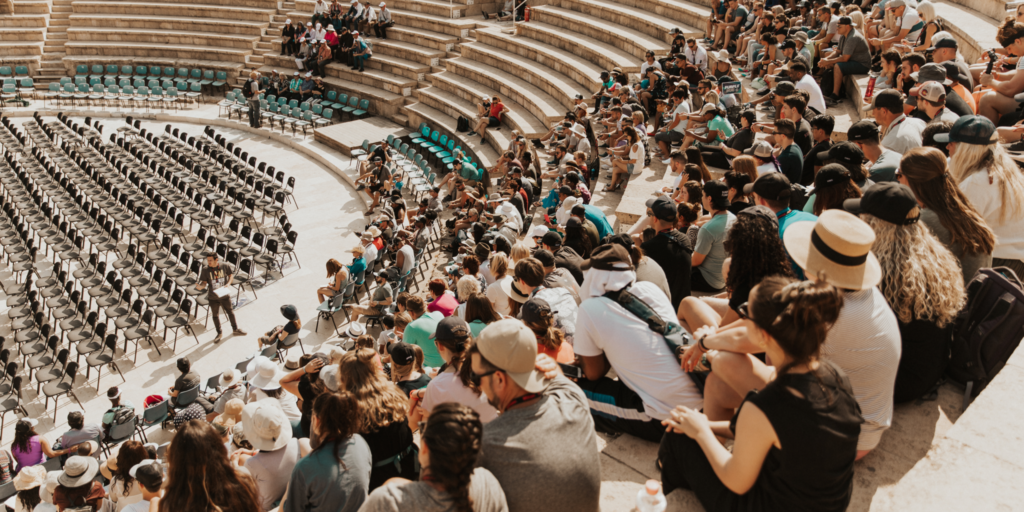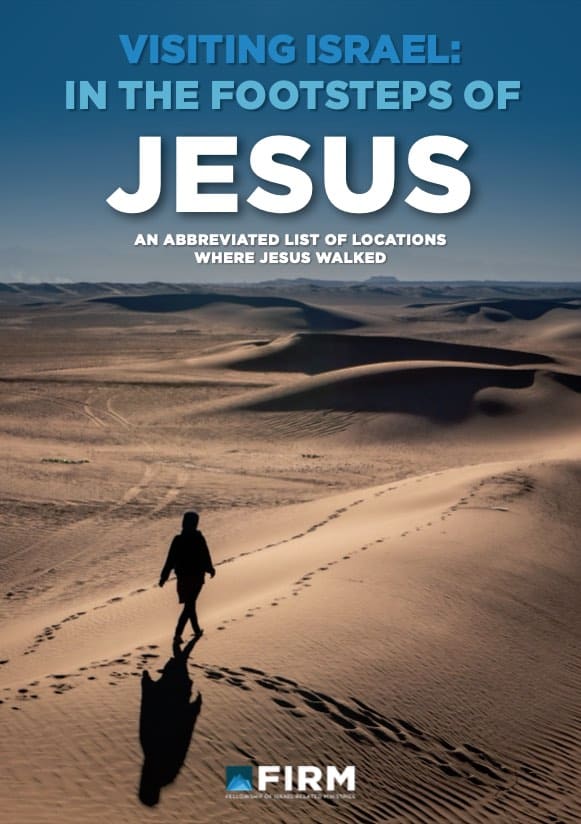Israel is home to many ancient heritage sites of the world.
One of the most unique and Biblically significant sites is Caesarea (also called Caesarea Maritime, to differentiate from Caesarea Philippi in the Golan Heights). It is located halfway between Tel Aviv and Haifa.
But what happened in Caesarea to justify its importance?
Caesarea’s splendor was evident during the life of Jesus, whose ministry took place during the height of the Roman Empire. Israel existed within the context of this vast empire, which stretched through the known world at the time.In this sense, the Empire connected Israel to the larger Mediterranean and Near East.
Later, we know God used the historical momentum of the Roman Empire to spread the Gospel forth. It went out through the Mediterranean, Asia Minor and the rest of the world. But the important fact is: the small town of Caesarea played a crucial part in this story.
Before the Life of Jesus
Once a Phoenician trading port, the city was originally called Straton’s Tower. It was given to Herod the Great by Emperor Augustus. Later, it was named Caesarea to honor Augustus Caesar.

The city, though far from its original splendor, still exhibits the greatness of the classical world and Herod the Great’s architectural and aesthetic eye.
Today, you can visit the Greco-Roman style deep sea harbor, aqueducts, hippodrome, and amphitheater that Herod built. Herod even had an indoor, Olympic sized, freshwater pool in his palace, which you can also see traces of today.
In the 6th Century CE, Rome made Caesarea the capital of its province of Judea and the headquarters of the 10th Roman Legion. As a result, the population of the city became half Jewish and half gentile, accommodating for the Roman officials and soldiers with their families.
The most infamous resident was Pontius Pilate, whose name was found inscribed on excavated stones of the theater. This inscription is one the few physical pieces of evidence for Pilate’s existence outside of the Bible.
The New Era after what Happened in Caesarea
But there is more to Caesarea than its Roman history. The town was the setting of significant events recorded in the New Testament. More specifically, events in Caesarea sparked gentile inclusion and the hope of the Gospel for all people.
It was here that the Apostle Peter met Cornelius, a Roman centurion who becomes one of the first gentile believers. What is more, Peter also baptized Cornelius and his two servants.

Cornelius can be likened to the Roman centurion mentioned in the Gospels, who believed Jesus would heal his servant (Matthew 8:5-13). In that passage, Jesus spoke of the many nations that would bear followers of Him.
“I say to you that many will come from east and west, and recline at the table with Abraham, Isaac and Jacob in the kingdom of heaven…”
God spoke to Cornelius in a dream. Coincidentally, the Lord also spoke to Peter through a vision less than 24 hours later.
Peter’s Vision
In this vision, Peter sees a sheet lowered from heaven with all sorts of unclean creatures, reptiles, and birds of the air. A Voice instructs Peter to kill and eat the creatures. But Peter protests, because it is against the law of Moses.
The voice in the vision tells Peter, “What God has cleansed, no longer consider unholy.”
While Peter pondered what this could possibly mean, a man sent by Cornelius arrived at Peter’s residence and was now knocking on his door. The Spirit of the Lord assured Peter that He had in fact sent these (gentile) visitors.
Peter was to accompany them back to Caesarea without hesitation or doubt. (Acts 10:19-20) Had Peter not received the vision of the Lord in those critical moments, he may have doubted and turned these visitors away.
To associate with gentiles, eat at their tables and be guests in their homes was sinful in the common Jewish understanding.
Scandalous Enmity
To best understand the relationship between Jews and gentiles in the time of the New Testament, one could use the words like fear, distrust and hostility.
The Jewish people were not to associate with idolaters, lest they become idolaters themselves. The most fanatic interpretations said they were not even to provide aid to gentiles or save them from danger. (Edersheim, 91)
19th Century New Testament scholar Alfred Edersheim, phrases the common Rabbinic attitudes towards idolaters in this way:
“They and theirs were defiled; their houses were unclean, as containing idols and things dedicated to them; their feasts, their joyous occasions, their very contact, was polluted by idolatry; and there was no security, if a heathen were left alone in a room, that he might not, in wantonness or carelessness, defile the wine or meat on the table, or the oil or the wheat in the store. Under such circumstances, therefore, everything must be regarded as having been rendered unclean.”

Jew vs. Gentile
Likewise, the gentiles did not view the Jewish people favorably either. They saw their resistance to Roman religion as stubbornness. Their insistence on worshipping an unseen God (so unlike all the other gods) was in their eyes fanatical and superstitious.
Edersheim writes,
“The educated Roman regarded the Jew with a mixture of contempt and anger, all the more keen that, according to his notions, the Jew had, since his subjection to Rome, no longer a right to his religion; all the more bitter that, do what he might, that despised race confronted him everywhere, with a religion so uncompromising as to form a wall of separation, and with rites so exclusive as to make them not only a strangers, but enemies.”
It is within this setting that the work of the Messiah becomes all the more astounding. He took down the wall of separation with His flesh. In the words of the Apostle Paul, in Ephesians 2:14,
“For He Himself is our peace, who has made us both one and has broken down in His flesh the dividing wall of hostility.”
Major Breakthrough in Caesarea
Once Peter arrived at Cornelius’ home, he shared his vision and started to preach the gospel to Cornelius and those gathered. The Spirit of the Lord fell on them while Peter was preaching.
The Jewish believers in Peter’s company were amazed… God poured out the Holy Spirit upon the gentiles! They were speaking in tongues and praising God! (Acts 10:44-46)
In Acts 15, Peter testified to this work before the Jerusalem Council, recounting God’s miraculous work among the gentiles. He emphasized that no distinction was made among them, as God had cleansed their hearts through faith. (Acts 15:7-9)

Caesarea Earns a Spot on the Map
What happened in Caesarea and what God did among the gentiles show us God’s immense power. It testifies of His grace that brought peace to those who were once hostile.
In fact, the scriptures tell us that Yeshua (Jesus) Himself is our peace. It is through His atoning work on the cross that the dividing wall of hostility was torn down.
And how does this relate to what happened in Caesarea? Caesarea continued to serve as an important place for the Apostles.
They often stayed there with Philip the evangelist and his daughters who prophesied (Acts 21: 8-10). Paul was held in custody in Caesarea, where he testified before the governor Felix, whose wife was Jewish, and King Agrippa, as well as the Roman tribunal.
Path to Reconciliation
Today in our world, there is again much hostility and barriers between fellow men. Each wound and injustice that may have been shoddily bandaged over in the past is now raw and uncovered by the current events.
There seems to be no end to strife. There is enmity between young and old, parents and children, men and women… Also democrats and republicans, politicians and the people, among nationalities and races, neighbor to neighbor, the rich and the poor.
Each against another.
In this time, it is more important than ever to remember the breakthrough that happened in Caesarea: that the beginning of peace is our Messiah Jesus. He Himself is the Good News.

New Hope in Jesus
Isaiah the Prophet said:
“How lovely on the mountains are the feet of him who brings good news, who announces peace and brings good news of happiness, who announces salvation, and says to Zion, Your God reigns!” (Isaiah 52:7)
It is time to remember Jesus’ miraculous reconciliation between Jew and Gentile, between yourself and Him, and between one another. Let the events in Caesarea inspire you. Share the gospel of peace with those in your life who do not have the same hope as you. Jesus is saying to us again today:
“Peace I leave with you; My peace I give to you; not as the world gives do I give to you. Do not let your heart be troubled, nor let it be fearful.” John 14:27

Visiting Israel: In the Footsteps of Jesus: Free PDF Download
It is quite exciting to think that while touring Israel you are walking on the same land that Jesus did.
Whether it is the reason why you came to Israel or not, it is worth noting which locations were significant to His life and ministry. God chose this piece of land to send His Son to live on earth. Many archeological findings confirm the locations mentioned in the Bible.
Articles Related to What Happened in Caesarea in the Bible?
Estimated reading time: 8 minutes
Bibliography
Edersheim, Alfred. The Life and Times of Jesus the Messiah vol. 1. Grand Rapids, MI: Eerdmans Publishing Company, 1965.